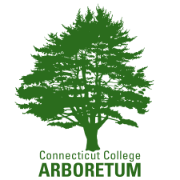
The Connecticut College Arboretum provides a welcome connection with the natural world, offering opportunities for
- teaching
- research
- conservation
- public education
- recreation
Connecticut College exists in a singular environment known as the Connecticut College Arboretum, which offers a quality of life and a conservation classroom unique among liberal arts institutions. The Arboretum's very diverse 750 acres include the landscaped grounds of the College campus as well as the surrounding plant collections, natural areas and managed landscapes. These resources all support the College's mission of preparing the next generation of citizen-leaders, whose diverse responsibilities will include crafting a sustainable relationship with the natural world. Our institution distinguishes itself by a long-standing commitment to conservation and supporting research and teaching in ecological and environmental studies. The symbiosis of the Environmental Studies Program, the Goodwin-Niering Center for the Environment and the Arboretum provides an outstanding model of an ethically and environmentally sound community.
The College has three major plant collections: the Campus Landscape, with 120 acres of trees and shrubs from around the world; the Native Plant Collection, 30 acres of woody plants and wildflowers indigenous to eastern North America; and the three-acre Caroline Black Garden, with a diversity of woody plants, many quite mature, in a garden setting. Professional curatorial techniques, such as mapping, inventories, labeling and computer databases, are used to keep track of the thousands of specimens now part of the Arboretum Collections. Labeled plants, guided tours, workshops and publications are part of the collection interpretation program.
All of the College property is available for teaching and research in environmental studies, the biological sciences and other academic programs. At least 30 different college courses utilize the Arboretum. The College aims to create a "living laboratory" that stimulates environmental awareness in students and those working at or visiting Connecticut College.
More than 200 acres are dedicated as Natural Area, lands kept as free as possible from human disturbance, and specifically available for observational research, teaching and recreation. Another 200 acres are available for manipulative projects, such as controlled burning experiments and vegetation management demonstrations. These lands have a rich tradition of long- and short-term ecological research by faculty and students.
The Arboretum offers visitors a chance to explore a diverse collection of natives and botanicals, to view a performance by Flock Theatre, or to just simply wander and enjoy the beauty of this precious natural resource.
Come visit in person and online, check out the many tours and programs conducted throughout the year and learn more about what the Connecticut College Arboretum has to offer!
Also be sure to check out Connecticut's Notable Trees, a rich database of Connecticut's largest and most historic trees that the Arboretum is proud to sponsor.
Level III Accredited Arboretum
Connecticut College Arboretum was awarded a Level III Accreditation through ArbNet. Level III arboreta have at least 500 species of woody plants, employ a collections curator, have substantial educational programming, collaborate with other arboreta, publicize their collections, and actively participate in tree science and conservation.
Land Acknowledgement
Connecticut College Arboretum honors the Mashantucket Pequot, Western Nehântick, Eastern Pequot, Mohegan, and other tribal nations who are indigenous to Nameaug, now called New London, and the land surrounding Coastal Alqonquin, also known as the “Long Island Sound Region.” We appreciate your careful stewardship of the land over many generations and acknowledge the suffering endured by your ancestors through the historical period of settler colonialism. Finally, we express gratitude that your tribal nations remain as neighbors in the region and that we continue developing opportunities for greater connection and partnership.